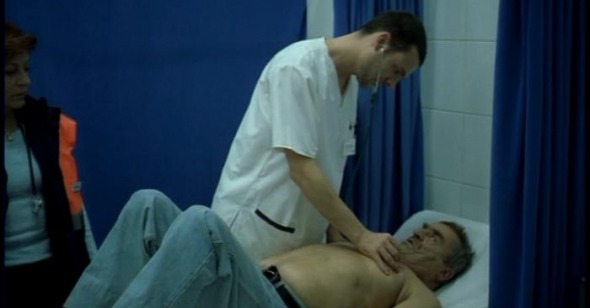Mortality Tale
By Nicolas Rapold
The Death of Mr. Lazarescu
Dir. Cristi Puiu, Romania, Tartan Films
Dante Remus Lazarescu first stands before us in the sort of black-and-white striped pajamas and cap worn by the criminals the Keystone Cops stumbled over one another to catch. The outfit evokes cinema’s most famous running joke on institutional incompetence, but the story in The Death of Mr. Lazarescu is more a tragedy of errors. Romanian director Cristi Puiu’s hospital drama never localizes these mistakes, nor makes a monolith out of The System to blot out all nuance (though the “Lazarescu” pun suggests Romanian health care might take a miracle to fix). He suggests an effective dramatic model for approaching a social issue without the usual melodrama or ostentatious sense of the exemplary.
Part of his success is that he introduces Lazarescu (Ion Fiscuteanu) getting up and sitting down around the home, a cat-loving tippler with the bad luck to have inscrutable complications from drinking or just from old age. These are intimate moments of an unself-conscious sort rare onscreen: calling his cats by private nonsense nicknames (“cat face” and, my favorite, “dog cat”), cursing at a broken closet door, and, as he gets sicker, spitting up vomit. Usually embodying the “lump” in lumpen, Lazarescu when provoked wields a dry deadpan sarcasm, the kind distilled over years of putting up with Communism’s crap (and also demonstrated by others). Nowadays his old neighbors still live across the way, offering him drugs with Euro-deathwish names like Distonocalm and Mastropol, but the apartment block hallway thumps with the tacky techno that, to judge from recent cinema, seems the most pervasive marker of post-Soviet bloc wasteland.
An EMT (Luminita Gheorghiu) finally arrives and chauffeurs Lazarescu through one hospital after the next, all swamped by victims of a highway pile-up. Throughout, Puiu sets the camera at the eye level, one that eschews the master shot’s distance or in-the-fray nosiness. Not that there is much of a fray, for most of the doctors and nurses who work in these hospitals move with the indifference born of routine, and worse. Puiu’s camera setup and the drifting haze of a narrative lend a self-effacing quality to the filmmaking, with the sense that two and a half hours is just the length it happened to end up as.
The humane accomplishments of the film, widely praised, do not need much defending, but I think it’s been insufficiently expressed how closely the experience of the film comes wrapped with a dissatisfaction belied by this mood of critical exultation. Not an unhappiness with the (very good) film, nor in the sense of how horrible that an old man should waste away in the grinding gizzard of the hospital beast—but as something overlooked and fundamental to the structure of the drama and performances. The film partakes of the scenario of the neglected protagonist (or “disappearing,” as Puiu has put it) familiar from end-game hospital sequences in other movies, or from street-children and vagrancy exposés.
Our quiet center, if not our point of view, is Lazarescu, whom we follow as he is ignored, and the drama of his existence is thwarted, in anti-spectacular, anti-dramatic fashion. He fades away in phases, unable to stand, unable to talk sense, unable to talk at all, in a negation that could form the subject of a Beckett play. “I say things you don’t understand,” Lazarescu protests to a nurse in one of his last lucid moments. Lazarescu is a great character who part of the time is not present; it’s an exceptional performance, and I can’t even think of another, better-known actor who could handle this. His guardian, the EMT, flickers her own way, in Gheorghiu’s brilliant antiheroic performance: she is there beside him and yet not selflessly there, caring yet still a professional, who will make her point to arrogant doctors but ultimately does want to kick off work at some point in the night. All this is not something that is easy to watch or, for me, to get celebratory about; somehow my greatest appreciation of the film would take the form of a prolonged mood of dour resignation. And perhaps that’s something of the particular ironic situation that Puiu gets at with the brassy old Romanian pop standards that open and close the movie.
